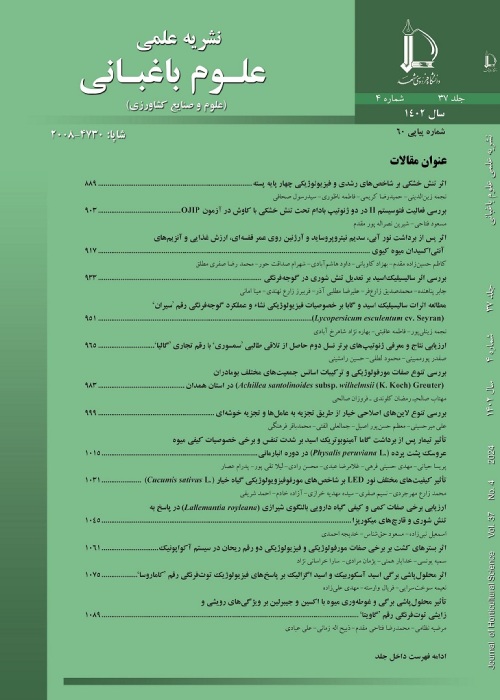The Effect of Salicylic Acid Application on Some Morphological and Physiological Characteristics of Grape Cultivars (Vitisvinifera L.) Under Drought Stress Conditions
Author(s):
Article Type:
Research/Original Article (دارای رتبه معتبر)
Abstract:
Introduction
Water stress is considered as a main environmental factor limiting crop growth and yield, including grape in Mediterranean areas.Selection for drought-tolerantvarieties is possible through investigation of their performance under stress conditions. The estimation of physiological characteristics as reliable indices can be used as a tool to select tolerant plants. For this reason, varieties and genotypes of one plant species are usually investigated through physiological characteristics and its relation to drought tolerance. Investigation of the effects of water stress on some growth and physiological characteristics in grape plants has revealed that plant height, number of leaves and nodes, leaf area and the percentage of dry weightdecreased under increasing drought stress. Salicylic Acid is a naturally occurring plant hormone whichinfluences various morphological and physiological functions in plant. It can act as an important signaling molecule and has diverse effects on biotic and abiotic stresses tolerance capacity.Materials And Methods
In this research, two-yearold grapesplanted in plastic pots containingingredients of humus, soil and sand (1:2:1) were used. The experiment was conducted using a factorial based on randomized complete block design with three factors including irrigation periods (every 5, 10 and 15 days), salicylic acid concentrations (0, 1 and 2 mM) and grape cultivars (Rasheh andBidanesefid) with 3 replications in thegreenhouse of faculty of agricultureinUrmia University. Plant height, stem diameter and leaf area and chlorophyll indicesweremeasuredby usingruler, digital caliper (Model22855 NO: Z), leaf Area Meter (ModelAM200) and SPAD-502 chlorophyll meter (Minolta Crop, Japan),respectively. In order to determine proline content, malondialdehyde (MDA), total protein and total soluble sugars, spectrophotometric methods [51,25,6and28] were utilized,respectively.Results And Discussion
Based on comparing the averages related to the interaction of various levels of drought and salicylic acid, increasing watering intervals resulted in significant decrease in parameters of plant height, stem diameter, leaf area, leaf number and chlorophyll index,and increase inproline content, malondialdehyde, total protein and total soluble sugars.Furthermore, according to the obtained results, plant height, stem diameter, leaf number, chlorophyll index, accumulation of prolineandtotal protein in grape cv. Rashehwere higher than Bidanesefidone.Drought effected the mitotic division, andelongation and expansion of cells, leading to reduced growth and crop yield. It was concluded that plant height, stem diameter, and leaf area decreased noticeably byincreasing water stress. The reduction in plant height could be attributed to decline in the cell enlargement and higher rate ofleaf senescence in the plant under water stress. The reduction in leaf number under severe water deficit was partially due to leaf senescence. Reduction inthe number of leaves could be a response by plants to minimize the transpiration surface. Sorghum plants have also been reported to have a similarbehaviorthroughwhichthey conserve water by reducing the number of leaves. When exposed to chronic water deficit, they showed an initial decrease in the daily increment of leaf area and eventually a decrease due to accelerated senescence. Dropping of the leaves during severe stress markedly reduces the evaporative surface and allows the plant to conserve water.It is well known that proline contents in leaves of many plants are enhanced by several stresses including drought stress. The efficiency of exogenous SA depends on multiple causes such as the species, developmental stage of the plant, manner of application and concentration of SA.Plant height, stem diameter, leaf number, leaf area, leaf total soluble sugar and chlorophyll index increased by applying 2 mM salicylic acid comparedwith 0 and 1 mM doses. The findings of this study showed that salicylic ¬acid was able to enhance the tolerant capacity of the grape plant to the drought stress. According to theobtained results, Rashehcultivar showed a greater resistance to drought stress. Salicylic acid prohibits auxin and cytokinin loss in plants and thus enhances cell division and plant growth. Salicylic ¬acid maintainsphotosynthetic aspects like chlorophyll content at proper level and thus helps plants to grow and developwell. In this study, the drought stress increased the amount of MDA.MDA and other aldehydes in the dry conditions are the result ofactive oxygen species (ROS) such as super oxide radical, peroxide, hydrogen and radical hydroxide, whichareproduced underoxidative stress conditions. The species of active oxygen leads to lipid's per oxidation as a result of injury or damage to the cellular membrane, especially chloroplast membrane.Salicylic acid increases the activity of antioxidant enzymes such as CAT, POD and SOD which in turn protect plants against ROS generation and lipid peroxidation. Salicylic acid treatment also providesa considerable protection from the enzyme nitrate reductase, thereby maintaining the level of diverse proteins in leaves.Mohammadkhani and Heidari (48) found that the initial increase in total soluble proteins during drought stress was due to the expression of new stress proteins.Keywords:
Language:
Persian
Published:
Journal of horticulture science, Volume:31 Issue: 2, 2017
Pages:
269 to 280
magiran.com/p1781601
دانلود و مطالعه متن این مقاله با یکی از روشهای زیر امکان پذیر است:
اشتراک شخصی
با عضویت و پرداخت آنلاین حق اشتراک یکساله به مبلغ 1,390,000ريال میتوانید 70 عنوان مطلب دانلود کنید!
اشتراک سازمانی
به کتابخانه دانشگاه یا محل کار خود پیشنهاد کنید تا اشتراک سازمانی این پایگاه را برای دسترسی نامحدود همه کاربران به متن مطالب تهیه نمایند!
توجه!
- حق عضویت دریافتی صرف حمایت از نشریات عضو و نگهداری، تکمیل و توسعه مگیران میشود.
- پرداخت حق اشتراک و دانلود مقالات اجازه بازنشر آن در سایر رسانههای چاپی و دیجیتال را به کاربر نمیدهد.
In order to view content subscription is required
Personal subscription
Subscribe magiran.com for 70 € euros via PayPal and download 70 articles during a year.
Organization subscription
Please contact us to subscribe your university or library for unlimited access!


